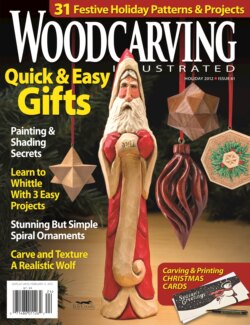Читать книгу Woodcarving Illustrated Issue 70 Spring 2015 - Группа авторов - Страница 14
На сайте Литреса книга снята с продажи.
ОглавлениеWoodcarving Illustrated
|
HOLIDAY 2012
12
By Kenneth M. Meyer of Lake City, Fla.
I often mix small batches of paint, use what
I need, and let the rest dry out and go to
waste. Then I figured out how to make individual cups
for mixing and preserving the paints. I use the small
plastic cups designed for serving communion wine at
church. They are available at Christian supply stores
and are usually reasonably priced. I drilled holes in a
"-thick board to hold the cups; they are flared so they
don’t fall through. To preserve the paint, simply cover
each cup with aluminum foil and the paint will stay
fresh for days.
TOP TIP
in our Spring Issue wins an
autographed copy of
Big Book of Whittle
Fun
, Chris Lubkemann’s newest book.
Send your tip to
Woodcarving
Illustrated
, 1970 Broad Street, East
Petersburg, Pa., 17520, or e-mail
Duncan@FoxChapelPublishing.com.
TOP
TIP
✔
Make a Carving Mallet
By John Albrand of Glen Mills, Pa.
For an inexpensive mallet with a great feel
that fits your hand perfectly, make your
own from an old wooden baseball bat. Cut
the handle from one end of the bat and the
barrel from the other end. Drill a hole
2" to 3" deep in the cut side of the barrel and
insert the handle, shaping the hole to fit as
necessary. Then, simply glue the handle into
the barrel.
tips and
techniques
Preventing Sticky Glue Nozzles
By Amy Nielsen of Maple Valley, Wash.
Dried glue used to build up on and clog the nozzle of my
cyanoacrylate (CA) glue tube. It was very frustrating.
Finally, I applied a small amount of petroleum jelly to a
tissue and wiped the nozzle, and the problem was solved.
An occasional wipe with the jelly works well to ensure the
glue doesn’t build up or clog the opening—no more mess,
and no more buying new glue or replacement nozzles.
Reusable Paint Palette
Turn an old bat into a
carving mallet with
two simple cuts.
Drill holes in a board and insert inexpensive plastic
communion cups to make a perfect paint palette.
Bonus Tip:
Claude
Freaner
of Woodbridge,
Va., suggests mixing
and storing paints in the
sample-sized jelly and
honey jars placed on the
breakfast tables at many
restaurants. Simply clean
the jars and attach your
own labels.
▲
▲
